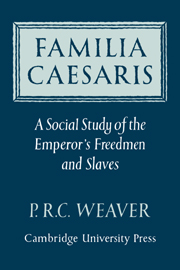4 - Cognomina and agnomina
Published online by Cambridge University Press: 07 October 2011
Summary
COGNOMINA
From the middle of the first century ad the cognomen had replaced the praenomen as the personal name for both freedmen and freeborn. This was true even in the equestrian and senatorial classes, as the nomenclature of Vespasian's family illustrates. This change occurred much earlier with the freedmen, who retained their slave name as their personal name or cognomen.
The social significance of cognomina, particularly those of Greek derivation, as has been mentioned above, is a matter of controversy. The high proportion of Greek-derived cognomina in the sepulchral inscriptions of Rome and elsewhere in the empire, together with the inter-generational change in the relative proportions of Greek and Latin cognomina, has led to the conclusion that a Greek cognomen is likely to indicate slave origin or freedman descent within two or three generations. The general weaknesses of this conclusion have been discussed above. But the high proportion of Greek personal names in the Familia Caesaris does nothing to disprove it.
Besides the controversy over whether some cognomina can be specified as servile in origin, there is the corresponding question whether some cognomina can be considered to have a distinctively freeborn or even upper-class connotation – the so-called ‘cognomina ingenua’ and ‘cognomina equestria’. The Familia Caesaris might be thought to have an illustrative role here, especially with those rare freedman members who were elevated to equestrian status. The test case is the cognomen ‘Marcianus’ taken by the freedman Icelus on his gaining equestrian rank under Galba.
- Type
- Chapter
- Information
- Familia CaesarisA Social Study of the Emperor's Freedmen and Slaves, pp. 87 - 92Publisher: Cambridge University PressPrint publication year: 1972



